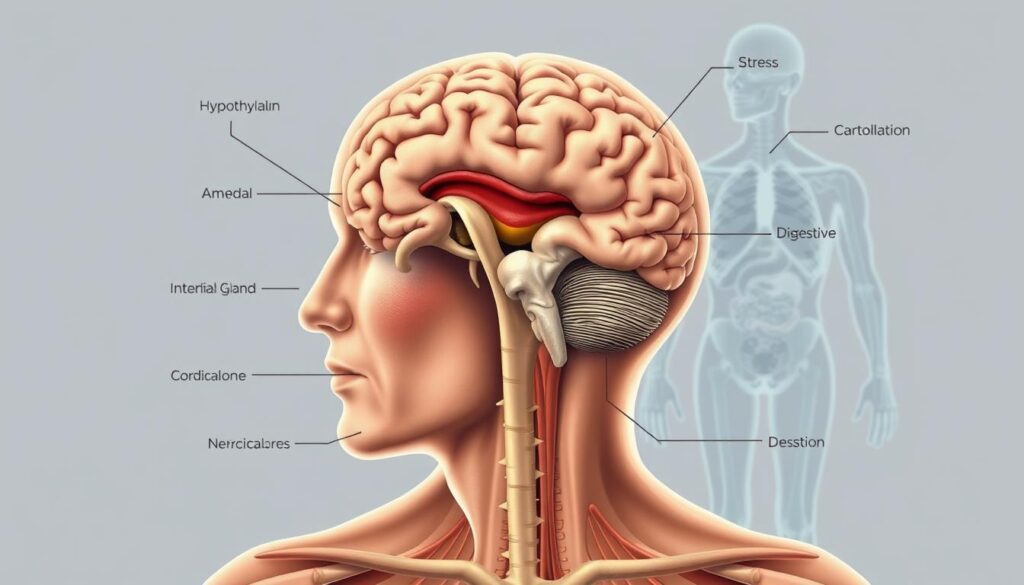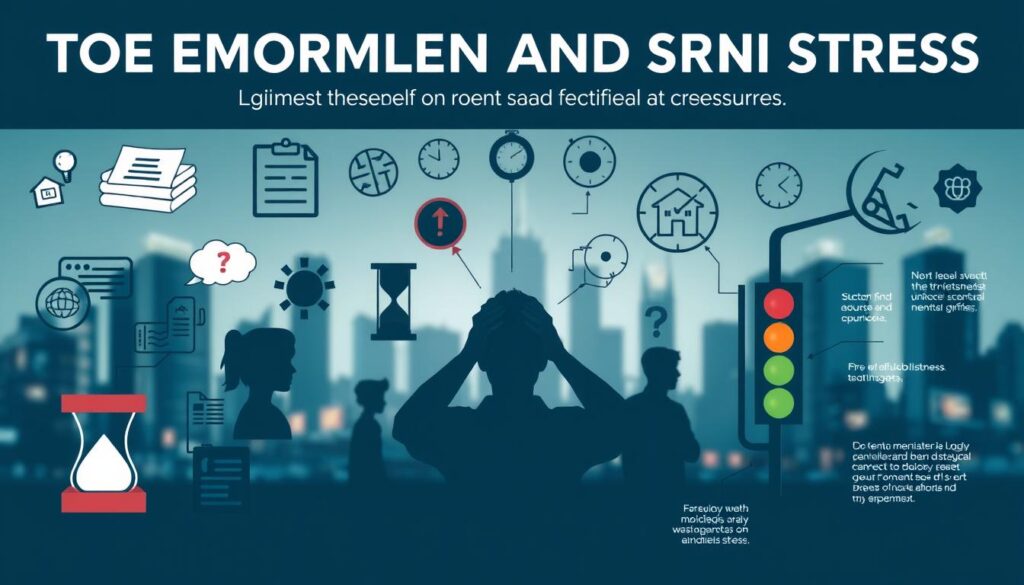Have you ever felt like stress is taking over your life? It’s like an invisible weight that makes you feel tired and cloudy. In today’s fast world, managing stress is key to survival.
Stress is a natural response that can turn into a big problem. It’s not about getting rid of stress, but learning to deal with it. This means finding ways to stay strong and use smart strategies.
Our lives are filled with too much noise and pressure. This makes it crucial to find ways to handle stress well. Whether it’s work or personal stuff, we need strong ways to cope.
Table of Contents
Understanding Stress and Its Impact on Mental Well-being

Stress is a big part of our lives today, hitting almost 75% of adults hard. It can really hurt your mental and physical health if it goes on too long.
Stress doesn’t just mess with your mind. It creates big problems that can affect your whole emotional health. Knowing how stress works is key to finding ways to feel better.
Physical Symptoms of Stress
Your body shows stress in many ways:
- Headaches (47% of stressed people get them)
- Muscle tension (45% feel it)
- Stomach problems (38% experience them)
- Bad sleep (50% have trouble sleeping)
Emotional Manifestations of Stress
Stress also makes you feel really down:
- It’s hard to focus (30% struggle)
- Forgetfulness is common (29% find it tough)
- Feeling irritable (35% get moody)
- Constant worry and anxiety
How Stress Affects Daily Performance
Long-term stress really messes with your daily life. It makes you less productive and lowers your quality of life.
| Performance Area | Stress Impact |
|---|---|
| Work Productivity | 40% of employees feel overwhelmed |
| Relationships | 40% report negative relationship impacts |
| Decision Making | Reduced cognitive clarity and focus |
Seeing these signs of stress is the first step to feeling better. It helps you find ways to manage anxiety and improve your emotional health.
The Science Behind Stress Response

Your body has a complex system to handle stress. It’s designed to keep you safe from threats. When stress hits, your nervous system kicks in, starting a series of physical changes.
The stress response has two main parts:
- Sympathetic-Adreno-Medullary (SAM) axis
- Hypothalamic-Pituitary-Adrenal (HPA) axis
When you face a sudden stress, your body releases important hormones. Adrenaline jumps up in just one minute, making your heart beat faster. Cortisol kicks in about 15 minutes later, getting your energy ready.
“The human stress response is a sophisticated survival mechanism that can become detrimental when chronically activated.” – Stress Research Institute
Studies show that long-term stress can harm you. It can:
- Up your risk of heart disease by 30%
- Weak your immune system
- Change your brain and how you think
Knowing how your body responds to stress helps you spot signs early. It lets you use better ways to manage stress and keep your mind healthy.
| Stress Hormone | Release Time | Primary Function |
|---|---|---|
| Adrenaline | Within 1 minute | Increase heart rate, boost energy |
| Cortisol | 15 minutes after threat | Mobilize energy resources |
By understanding these detailed processes, you can find better ways to handle stress. This helps protect your mental health.
Common Triggers of Mental and Emotional Stress
Stress is a big problem in today’s world. It affects almost every part of our lives. Knowing what causes stress can help you find ways to cope and feel better before it gets too much.

Studies show that stress is a big issue in the U.S. More than 70% of adults face physical and emotional symptoms from stress. Many things can make us feel stressed.
Work-Related Stressors
Work can be a big source of stress. Here are some common work-related stressors:
- 40% of U.S. workers say they feel stressed at work
- 25% say work is their main stress source
- Deadlines and job security worries add to the pressure
- Too much work can lead to mental burnout
Relationship and Social Pressure
Stress also comes from our social lives. Over 50% of Americans say relationship problems cause them stress. These issues can include:
- Challenges in family relationships
- Social expectations
- Trying to balance work and personal life
- Having trouble talking to others
Financial Concerns and Anxiety
Money worries are a big stress for many. Research shows 75% of adults deal with financial stress at some point. This can really affect our mental health. Some financial stressors are:
- Dealing with debt
- Job insecurity
- Higher living costs
- Unexpected bills
By knowing what causes stress, you can start working on ways to handle it. This can help improve your mental health.
Mindfulness Practices for Stress Management
Mindfulness practices are a strong way to handle stress and clear your mind. They help you stay in the present moment. This can change how you see stress and make you more emotionally strong.
Studies show meditation is great for stress. In fact, an eight-week mindfulness program can be as good as anti-anxiety drugs. It can really cut down on psychological stress.
- Mindful breathing techniques can relax you in just five minutes
- Body scans increase awareness of your body
- The “Five Senses” exercise boosts awareness of the present
Regular mindfulness changes your brain. Studies show that meditation can:
- Grow gray matter density
- Boost the prefrontal cortex
- Lower stress-response activity
Key mindfulness techniques to reduce stress include:
- Mindful breathing
- Body scanning
- Mindful eating
- Meditation
Starting mindfulness can be tough because of high expectations. It’s about practice and acceptance, not being perfect. Start small, be patient, and slowly improve your mindfulness.
Mindfulness is not about eliminating stress, but about changing your relationship with it.
Natural Ways to Lower Stress
Learning effective relaxation techniques can change how you handle daily stress. Stress doesn’t have to rule your life with the right strategies. Adding simple calming exercises to your day can greatly boost your mental and physical health.
Breathing Techniques for Instant Relief
Deep breathing is a strong way to fight stress. Studies show several effective methods:
- Box breathing: Inhale for 4 seconds, hold for 4 seconds, exhale for 4 seconds
- Diaphragmatic breathing: Focus on deep belly breaths
- Alternate nostril breathing: Alternate breathing through each nostril
A study found that diaphragmatic breathing can greatly lower stress. It helps you feel clearer mentally and emotionally.
Physical Exercise Benefits
Moving your body is a natural way to reduce stress. The CDC suggests 150 minutes of moderate exercise each week. A 6-week study with 185 university students showed that regular aerobic exercise cuts stress.
- Releases mood-boosting endorphins
- Improves overall mental health
- Provides a natural energy boost
Connecting with Nature
Being outside has amazing stress-reducing effects. Research shows that just 10 minutes in nature can boost your mood and lower stress.
- Reduces cortisol levels
- Promotes mental relaxation
- Offers a break from daily pressures
By using these natural relaxation methods and calming exercises, you can fight stress and enhance your life quality.
Nutrition’s Role in Mental Clarity
Your diet is key in managing stress and keeping your mind clear. What you eat affects your brain’s ability to handle stress. It’s not just about eating; it’s about giving your body and mind the right fuel.
Some foods can really impact your stress levels and how well you think. Studies show that what you eat can either make anxiety worse or better.
- Omega-3 fatty acids reduce inflammation and support brain health
- Magnesium helps regulate cortisol, the primary stress hormone
- High-fiber vegetables support gut health, which is linked to mental well-being
- Probiotics in yogurt can improve mood and reduce anxiety
Foods to cut down on for better emotional health include:
- High-sugar processed foods
- Excessive caffeine
- Alcohol
- Trans fats
| Food Group | Stress-Reducing Benefits | Recommended Intake |
|---|---|---|
| Fatty Fish | Omega-3s, reduces inflammation | 2-3 servings per week |
| Nuts | Magnesium, healthy fats | 1 handful daily |
| Leafy Greens | Supports cognitive function | 2-3 servings daily |
Pro tip: Drink plenty of water and eat balanced meals to better handle stress. Your diet is a strong tool for building mental strength and improving emotional health.
Creating Daily Stress-Relief Routines
Creating daily routines is a great way to manage stress. When life gets too much, having a plan helps you feel in control. Your daily routine is like a map to your mental well-being.
About 77% of people deal with chronic stress often. By starting your day with purpose and ending it with calm, you can lower stress. This improves your mental clarity.
Crafting Effective Morning Rituals
Your morning sets the tone for the day. Start with habits that calm your mind and prepare you for what’s ahead.
- Practice 10 minutes of meditation or deep breathing
- Write three gratitude statements in a journal
- Engage in light stretching or gentle exercise
- Avoid checking emails or social media immediately after waking
Relaxing Evening Wind-Down Practices
Evening routines help you release tension and get ready for sleep. Mindful activities can lower cortisol and help you relax.
- Create a consistent sleep schedule
- Practice light stretching or yoga
- Use aromatherapy or calming music
- Read a book or practice gentle meditation
*”Consistency is key in developing stress-relief routines that truly work for you.”*
Starting stress-relief routines takes patience and trying different things. Begin with small changes and build a routine that fits your life. Remember, managing stress is a journey of self-discovery and growth.
The Power of Physical Activity in Stress Reduction
Looking for ways to lower stress can change your life. Physical activity is a strong tool for managing stress and boosting health. Studies show that regular exercise can cut down stress and make you more emotionally strong.
Calming exercises have many benefits for your mind and body. The CDC says adults should do 150 minutes of moderate exercise each week. This can greatly help with stress management. Let’s see how different physical activities can fight stress:
- Aerobic exercises like walking, swimming, or cycling release endorphins
- Strength training helps reduce tension and improve mood
- Yoga and stretching promote relaxation and mindfulness
Your body reacts to physical activity by lowering stress hormones and boosting happy chemicals. Even short bursts of movement can make a big difference. Try adding these stress-reducing activities to your daily life:
- Take a 10-minute walk during lunch breaks
- Use stairs instead of elevators
- Practice desk exercises between work tasks
- Join group fitness classes for social connection
Physical activity does more than just reduce stress. It also brings many health benefits. Active people sleep better, think clearer, and have a lower risk of chronic diseases. Start small, pick activities you like, and build a regular exercise routine that supports your health.
Conclusion
Managing stress is a personal journey that needs patience, commitment, and kindness to yourself. You don’t need a complex plan to improve your emotional well-being. Small, consistent steps can lead to big changes.
Practicing daily meditation or short exercise bursts can help reduce stress. Every action you take matters.
When managing stress feels tough, professional help is available. Services like BetterHelp can connect you with licensed therapists in just 48 hours. This provides immediate mental health support.
Remember, seeking help is a sign of strength, not weakness. Techniques like gratitude journaling, mindfulness, and setting healthy boundaries can change how you handle stress.
Your emotional well-being is a journey that needs ongoing care. Try different stress-reduction techniques and see what works best for you. Stay open to change.
Regular exercise, balanced nutrition, and good social connections help keep your mind clear and strong. By focusing on your mental health, you’re investing in a better life.
Everyone’s journey to managing stress is unique. Be curious, be kind to yourself, and remember that progress is about consistent effort, not perfection. With the right strategies and support, you can grow emotionally stronger and face life’s challenges with more confidence.

